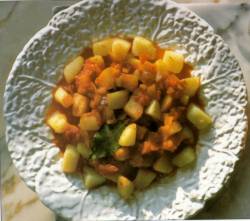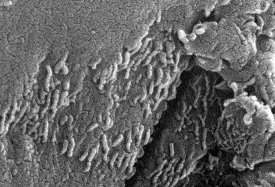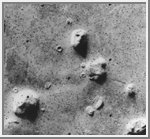I'm back!
-- -- -- -- -- -- -- -- -- -- -- -- -- -- -- -- -- -- -- --
Warm Enema:
How many light bulbs does it take to screw in a person?
A few.
-- -- -- -- -- -- -- -- -- -- -- -- -- -- -- -- -- -- -- --
kskyhappy:
How do you make the hot sauce that goes with the popular tapas dish "patatas bravas"?
For the record, "Patatas Bravas"
is hot sauce, with crispy potatoes.
Ingredients:
- Two large baking potatoes
- 6 tablespoons Oil for roasting (olive oil if you can)
- small onion
- 2 tbsp olive oil
- one clove garlic
- one small red (bell) pepper
- 1kg tomatoes
- one red chilli pepper
- glass of red or white wine
- 2 tbsp sugar
- half teaspoon cayenne pepper
- half teaspoon ground paprika
- salt and pepper
Method:
Heat the oven to gas mark eight, 200 c / 400 f. Put half the olive oil on a roasting pan and place in the oven to let the oil heat through
Peel the potatoes and chop into large chunks, about one inch square. When the oven is hot, remove the baking tray and add the potatoes (be careful for oil spitting). Cover with the remaining oil and return the potatoes to the oven.
Roast the potatoes until they are soft in the middle and slightly crispy on the outside. This takes between 30 and 45 minutes. You should turn the potatoes every ten minutes or so to make sure that they cook evenly.
Meanwhile, make the bravas salsa: Chop the onion finely and cook gently in the oil. Add the garlic. Once the onion is soft (ten minutes), chop both peppers and add to the onion. (leave the chilli pepper seeds out if you don't want the sauce to be too spicy).
Add the spices to the onion and pepper, and let the whole lot cook very gently until the pepper is softened. Wash your hands, chopping board and knife to make sure the pepper juice doesn't go astray.
If you feel energetic, you can skin the tomatoes by plunging them into a pan of boiling water, waiting until the skin splits, then skewer them on a fork while you peel off the skin.
Chop the tomatoes, removing and hard green bits by the stalk, and add to the onions with the wine. Cook for another fifteen minutes until the sauce has reduced. Season with the sugar and salt and pepper.
To serve, drain the oil off the potatoes, and place on a plate. Mound the sauce over the middle of the potatoes (so that some of the potatoes are not covered in sauce and some are.
Et voila, Patatas Bravas!

-- -- -- -- -- -- -- -- -- -- -- -- -- -- -- -- -- -- -- --
Bobbyburns:
what year did the aztecs defeat the japanese at the battle of the kool mo dee concert?
What?!
-- -- -- -- -- -- -- -- -- -- -- -- -- -- -- -- -- -- -- --
RainbowGurl:
Ohh, 8pm? We can be out most of the night, then go to yours for a surprise sweetheart!
Hello!! I'm in trouble!
-- -- -- -- -- -- -- -- -- -- -- -- -- -- -- -- -- -- -- --
Halo:
Why is the word "lieutenant" pronounced "lef-tenant" in English?
The etymological origins are from the Latin: loco tenens (place holder),
thence to the French, lieu (place) tenente, thence to the combination,
lieu-tenant. "One who holds the position of..." In other words, a kind
of deputy or substitute, a "junior officer" subordinate to a higher.
The word lieutenant came into Middle English from Middle French, sometime
between 1325 and 1375, as a noun use of the adjective phrase lieu tenant
'place-holding'. The ultimate source of the British pronunciation
"lef-TEN-ant," while not completely shrouded in mystery, remains uncertain.
There are, however, a few clues.
In the time of Chaucer (1340-1400), the distinction between the letters u
and v did not yet exist in writing. Once they separated, people remained
uncertain as to which sound each of these letters represented. As late as
the 18th century, the use of the sound "v" for the letter "w" (and vice
versa) was being roundly criticized by grammarians. Another theory focuses
on auditory rather than visual confusion. According to some scholars, the
gliding sound "w" at the end of French lieu, a sound made with the lips,
was heard by speakers of English as either of two other sounds involving
the lips: "f" and "v." This theory has some merit if we consider that the
"w" may well have been accompanied by some degree of audible friction, a
kind of blowing sound. I believe it's called a "fricative".
In any case, the pronunciations with "f" and "v" are reflected in various
14th-century English spellings of lieutenant, which included leef-, leve-,
lyff- and later lief-, live-, liev-, and luff-. Other early forms reflected
a "w" pronunciation, among them lu-, lieu-, lyue-, and lew-.
Even after the spelling of lieutenant settled, the "f" and "v"
pronunciations remained, and variations of "lef-TEN- ant" are the usual
British pronunciations today. In 1721, Dr. Isaac Watts, in his The Art of
Reading and Writing English, complained that such terms are "pronounced in
a very different Manner from what they are written, according to the
Dialect or corrupt Speech that obtains in the several counties of England."
He added that such pronunciations occur "especially among the Vulgar." John
Walker, in the 1836 edition of his A Critical Pronouncing Dictionary and
Expositor of the English Language, agreed, writing optimistically "the
regular sound, as if written Lewtenant, seems not so remote from the
corruption as to make us lose all hope that it will in time be the actual
pronunciation."
This did not happen in England, but it did happen here, largely because of
the influence of Noah Webster--not only through his dictionaries but
through his widely distributed American Spelling Book (1788), which sold
more than 60 million copies. A passionate supporter of American linguistic
independence, Webster almost single-handedly promulgated American
pronunciations as well as American spellings.
-- -- -- -- -- -- -- -- -- -- -- -- -- -- -- -- -- -- -- --
RaVeN:
I'm going to go lie down now and pray that Martin didn't get in another wreck.
Just saw that; I'm touched, you big moose you. Come here and give me a hug!
-- -- -- -- -- -- -- -- -- -- -- -- -- -- -- -- -- -- -- --
That'll be all, for today!
NEXT!
Cheers, Martin













